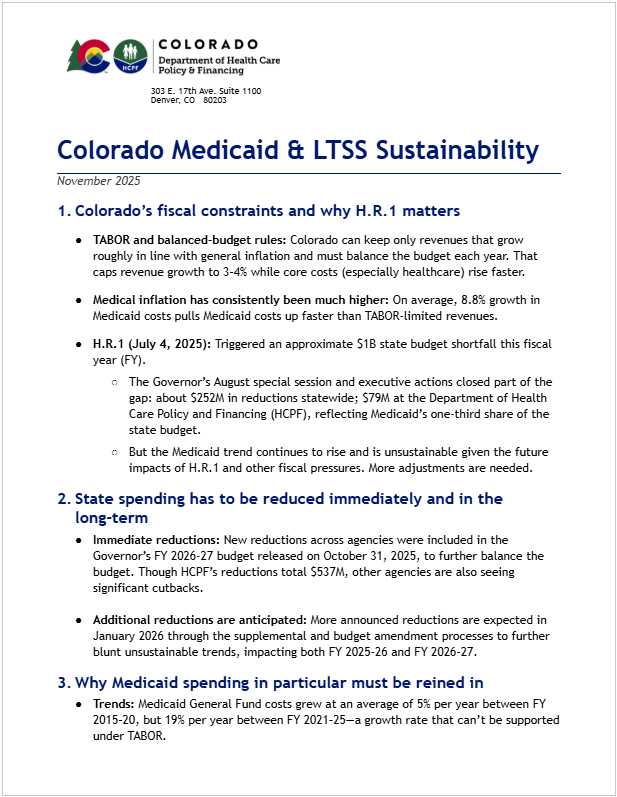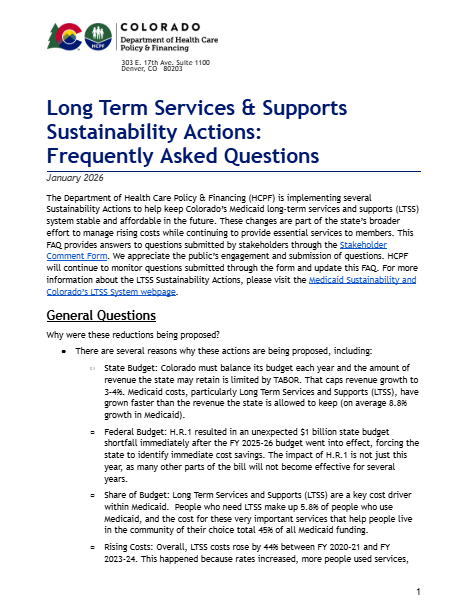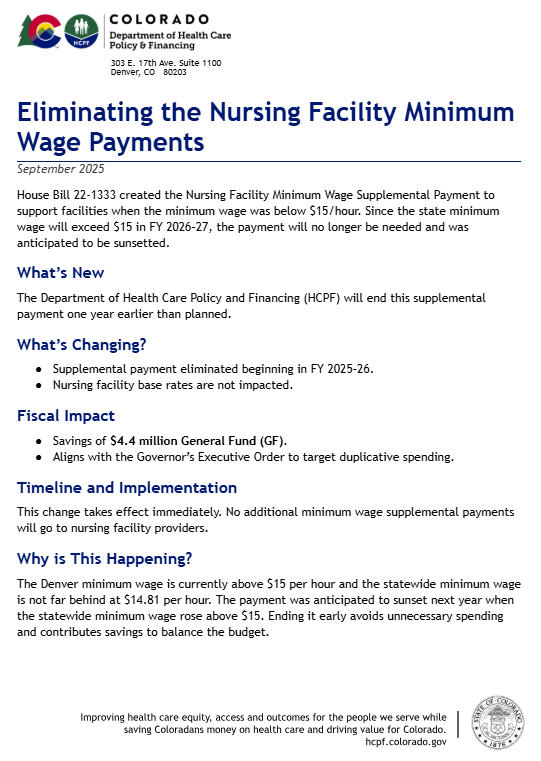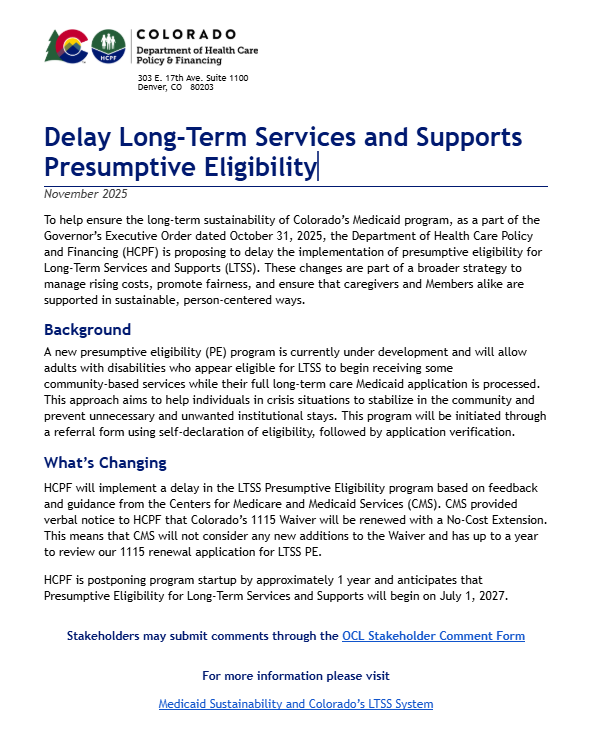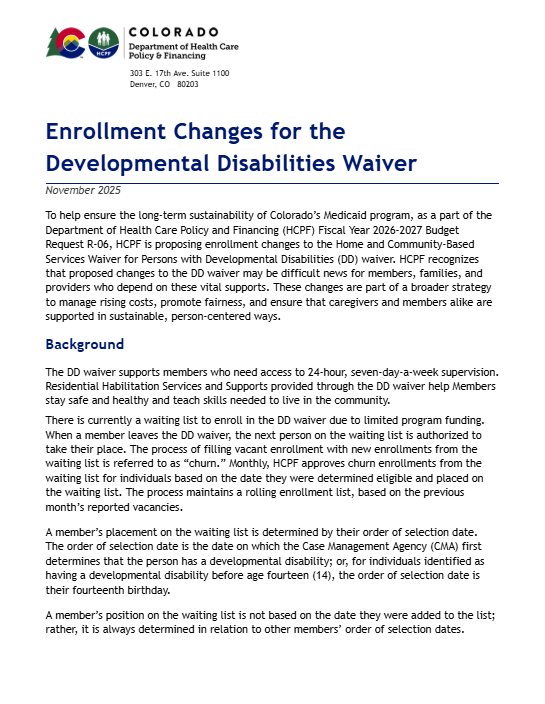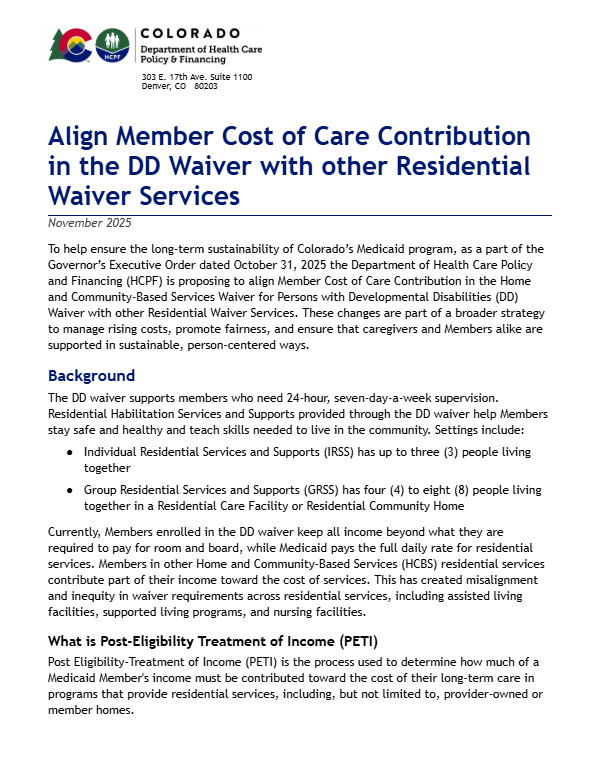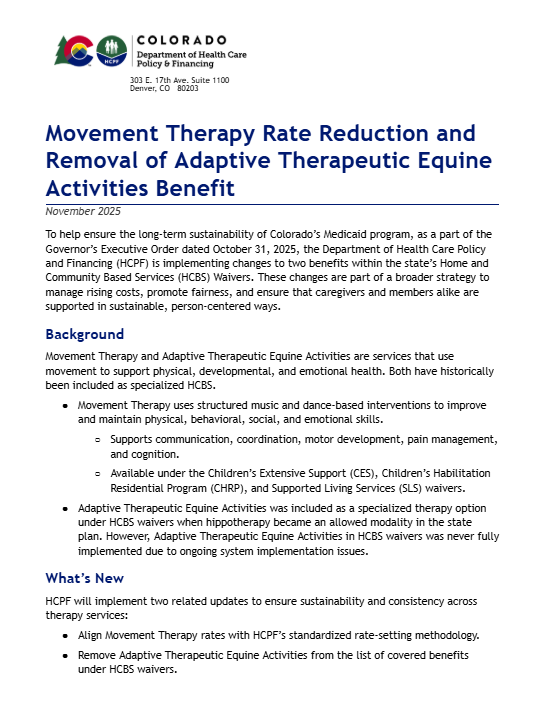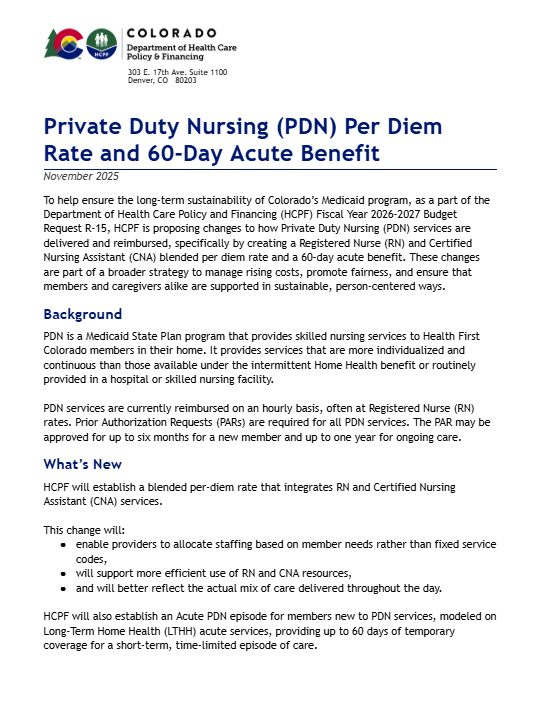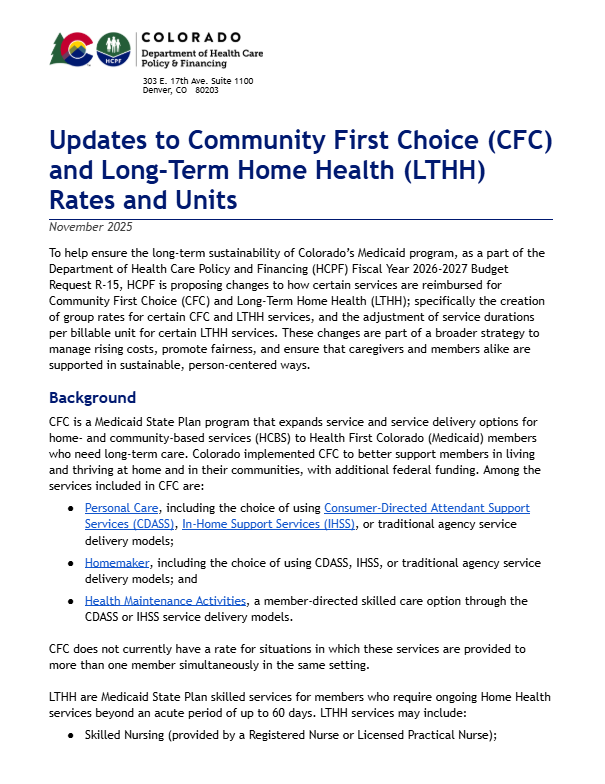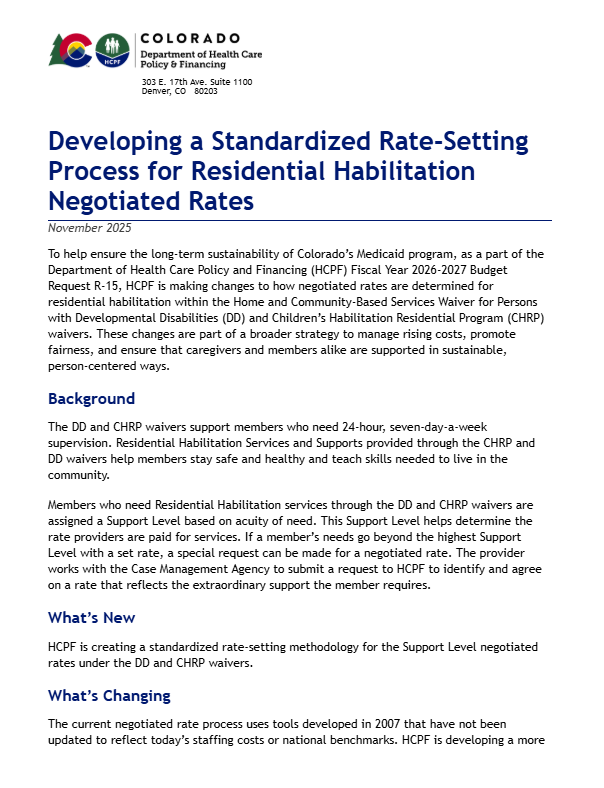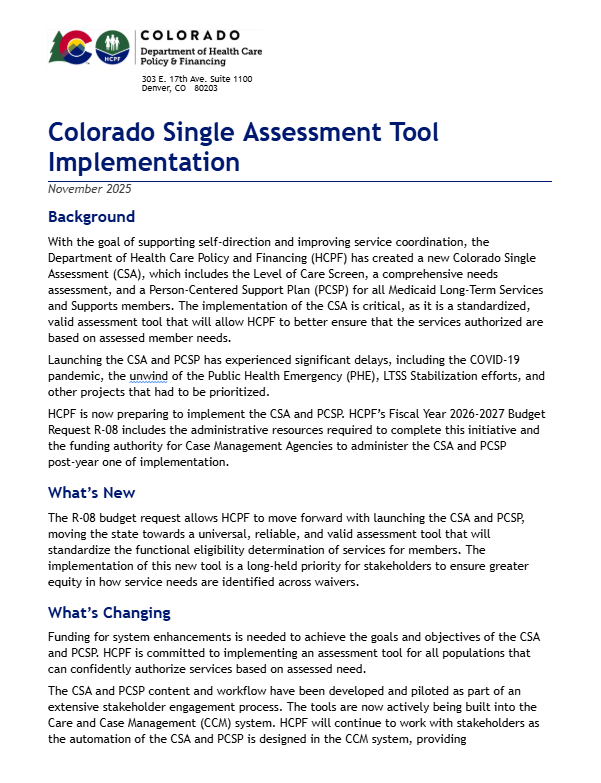Medicaid Sustainability and Colorado's LTSS System
Background / Why Is This Happening Rule Revisions Stay Informed
FY 2026–27 Budget Requests HCPF Budget Reduction Fact Sheet and Summary
HCPF Medicaid Sustainability Page
Colorado’s long-term services and supports (LTSS) system plays a critical role in ensuring that older adults and individuals with disabilities have access to care in the setting of their choice. Over the last several years, the state has invested over $600M to expand access, improve equity, and strengthen the direct care workforce. Investments into the LTSS infrastructure to support a strong workforce and large provider network will help ensure a solid system for years to come.
However, ongoing fiscal constraints—including new federal mandates and limits on state revenue growth—require the Department of Health Care Policy and Financing (HCPF) to reassess and align its policies to ensure long-term sustainability.
Our Commitment
The Office of Community Living (OCL) remains committed to transparency, accountability, and partnership throughout this process. Sustainability is not a one-time goal but an ongoing responsibility—to the individuals served by the Medicaid program, to the providers who deliver care, and to the taxpayers who fund it.
For Members and Families
In the coming months, your case manager will talk to you about changes coming to LTSS that may impact you, and they may send you this letter (en Español) from HCPF explaining the changes. This website provides more information about the changes that may impact your services. The following resources can be found below under "LTSS Sustainability Actions and Resources" and within each topic.
Fact Sheets - Overview of each change, including how it works now and what will change.
Memos - Directions for case managers and providers about how to make the changes, including information for members and families.
Action-specific resources - Member and family resources to support a deeper understanding of the services undergoing changes.
If you have comments or questions, you can submit a HCPF Office of Community Living - Governor's Budget Announcement - Stakeholder Comment Form.
Summary of Stakeholder Feedback on LTSS Sustainability Changes
Thank you to everyone who has submitted their comments and questions to our HCPF Office of Community Living - Governor's Budget Announcement - Stakeholder Comment Form. We have been reviewing all of the submissions and have compiled them into a summary document reflecting the major themes and concerns we have heard as of November 18, 2025.
Read the Summary of Stakeholder Feedback
Colorado Medicaid & LTSS Sustainability Fact Sheet and Frequently Asked Questions (FAQ)
LTSS Sustainability Actions and Resources
Addressing LTSS Trends
Through the Governor's Executive Order and FY 2026-27 Budget Requests, HCPF will pursue a number of actions to slow the trend growth within LTSS, focusing on those services and waivers that are key drivers. Included below are the actions announced through the Governor’s August 18, 2025 Executive Order, HCPF FY 2026-27 Budget Requests that impact LTSS programs (R-08, R-15, and R-17), and the newly announced R-06 Executive Order and Other Spending Reductions.
Eliminate the nursing facility minimum wage supplemental payment
Across the Board Provider Rate Reductions (1.6% and 0.75%)
| Fact Sheet | Overview |
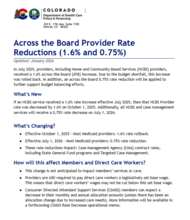
|
Implementation Date: October 1, 2025 and July 1, 2026 |
Community Connector: Rate Reduction
| Fact Sheet | Overview |
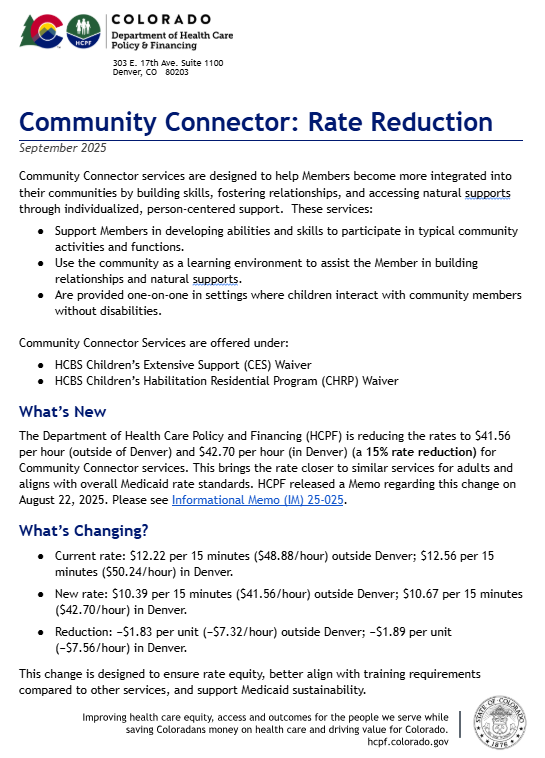 |
Expected Implementation Date: January 1, 2026 |
Paused - Align the Individual Residential Services and Supports rates for host home and family caregiver homes
| Fact Sheet | Overview |
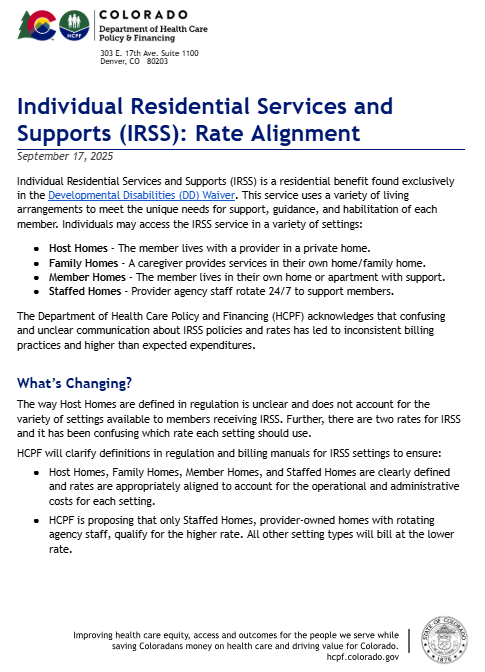 |
Expected Implementation Date: Paused |
Delay Presumptive Eligibility for Long-Term Services and Supports
Auto Enrollment Changes for Certain Youth Transitions in DD Waiver
Reduce Developmental Disabilities Waiver Churn Enrollment
Align Member Cost of Care Contribution in the DD waiver with Other Residential Waiver Services
Implement a Soft Cap on Certain HCBS Services
| Fact Sheet | Overview |
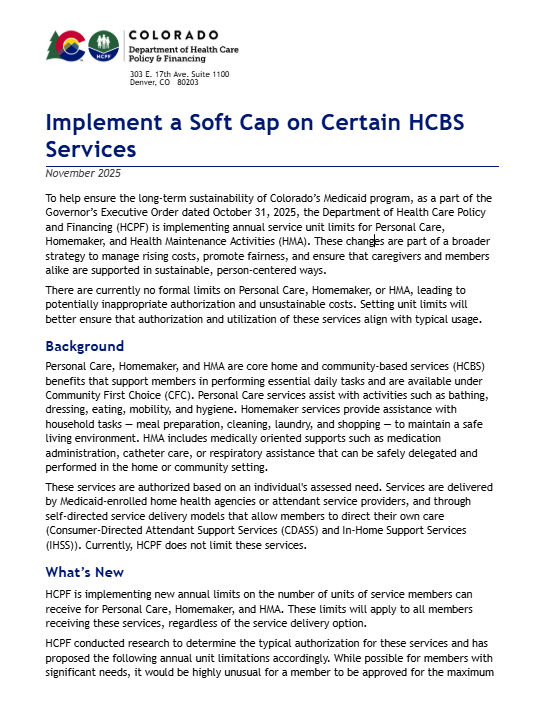 |
Expected Implementation Date: Pending federal approval; April 1, 2026 |
Paused - Implement a Cap on Weekly Caregiving Hours
| Fact Sheet | Overview |
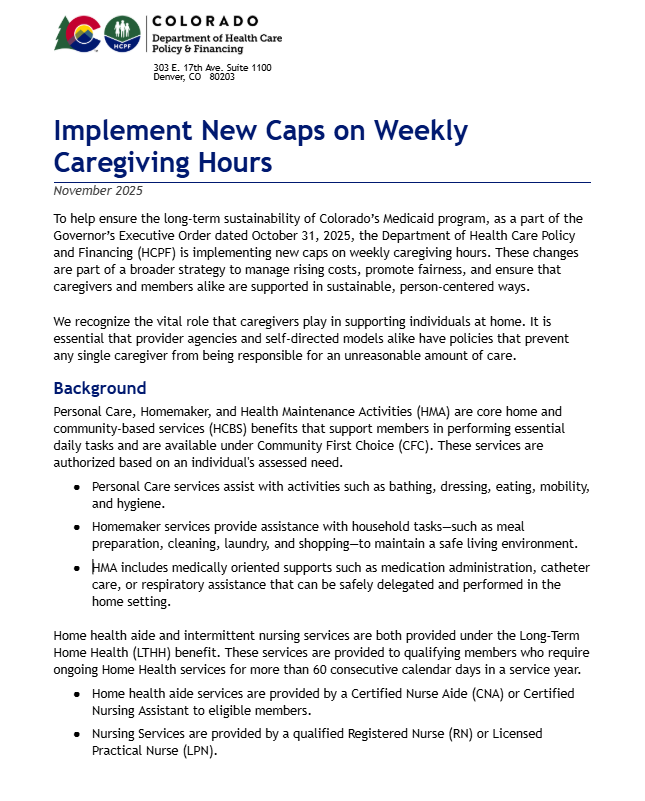 |
Expected Implementation Date: Paused |
Implement a Cap on Weekly Homemaker Hours for Legally Responsible Persons
| Fact Sheet | Overview |
 |
Expected Implementation Date: Pending federal approval; April 1, 2026 |
Withdrawn - Reduce Movement Therapy Services to Align with Rate Methodology
As reflected in Supplemental/Budget Amendment-07, HCPF is requesting the withdrawal of the proposed rate reduction for Movement Therapy, including Music Therapy. At this time, we do not believe a rate reduction is justified or appropriate given the professional standards and service needs associated with these therapies.
Remove Equine Services in Home and Community-Based Services (HCBS)
Align Community Connector Rate with Supported Community Connections
| Fact Sheet | Overview |
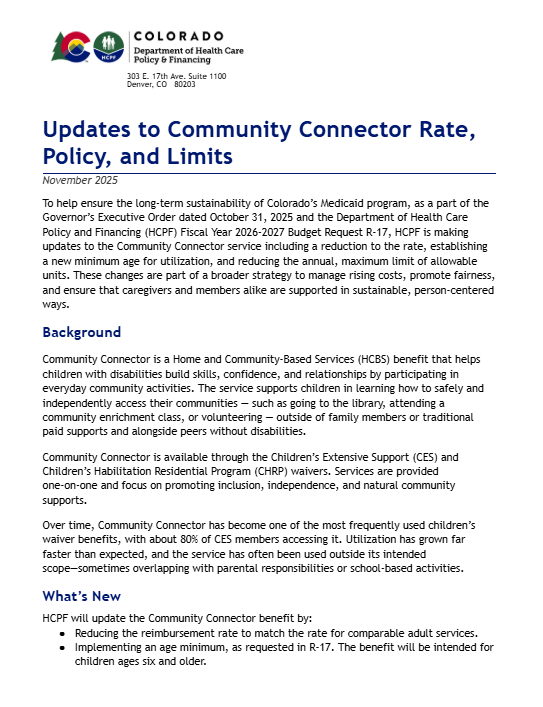 |
Expected Implementation Date: Pending federal approval; April 1, 2026 |
Implement New Service Unit Limitations for Community Connector
| Fact Sheet | Overview |
 |
Expected Implementation Date: Pending federal approval; April 1, 2026 |
New Community Connector Age Restrictions
| Fact Sheet | Overview |
 |
Expected Implementation Date: Pending federal approval; April 1, 2026 |
Establish Private Duty Nursing (PDN) 60-Day Acute Benefit
Establish Private Duty Nursing (PDN) Per Diem Rate
Adjust Service Durations per Billable Unit for Long-Term Home Health (LTHH) Services
Create Group Rates for certain Community First Choice (CFC) and Long-Term Home Health (LTHH) Services
Develop a Standardized Rate Tool for Residential Habilitation Negotiated Rates
Colorado Single Assessment
Current Fiscal Environment
Federal Policy Changes: New federal legislation, H.R.1 (One Big Beautiful Bill Act), significantly alters Medicaid financing, administrative requirements, and eligibility processes, which increases state-level financial obligations.
State Budget Constraints: Medicaid comprises over one-third of Colorado’s state budget. The growth of LTSS expenditures—driven by increasing utilization, demographic shifts, and rising labor costs—has outpaced available revenue.
As a result, several actions have been taken by HCPF and the Governor’s office:
- The Governor’s Executive Order issued August 28, 2025, initiated $252 million in budget reductions across state agencies—including approximately $79 million in reductions to HCPF, reflective of the Department’s share of the state budget and its recent cost trends.
- The Governor’s Executive Order issued October 31, 2025, initiated an additional $537 million in budget reductions to HCPF, most of which will begin this fiscal year to quickly realize savings to address the state’s current and future budget challenges. The original Executive Order was extended on November 30, 2025.
- HCPF has proposed several changes through budget requests in Fiscal Year 2026-27 as cost containment and sustainability measures.
View Colorado Medicaid & LTSS Sustainability Fact Sheet (October 2025)
Medicaid Sustainability Framework
HCPF is using a Medicaid Sustainability Framework to focus on trend drivers, maximize federal funds, make targeted benefit and rate adjustments, and pause or unwind unaffordable new items—to avoid draconian cuts.
- Address Drivers of Trend: Better address all the controllable factors that drive Medicaid cost trends
- Maximize Federal Funding: Leverage and maximize HCPF’s ability to draw down additional federal dollars
- Invest in Coloradans: Continue investing in initiatives to drive a Colorado economy and educational system to reduce the demand for Medicaid over the long term as Coloradans rise and thrive
- Make Reasonable Medicaid Cuts or Adjustments: Identify where programs, benefits, and reimbursements are comparative outliers or designed in such a way that we are seeing - or will experience - higher than intended trends or unintended consequences
- Reassess New Policies: Consider pausing or adjusting recently passed policies not yet implemented
- Exercise Caution in Crafting Increases: to the Medicaid program going forward
Long-Term Services and Supports: Growth Is Outpacing Funding
Overall LTSS costs rose 44% between FY 2020-21 to FY 2023-24 driven by: 49% rate increases, 39% utilization, 11% enrollment.
- A targeted approach is critical to address the areas that are most significantly driving the trend in LTSS.
Enrollment trends: Significant enrollment growth has been seen across many HCBS waivers, as well as increases in the cost per member per month.
Benefit and utilization trends: The costs for particular services are exploding, impacted by a stark increase in the number of hours being used per member.
Through the Governor's Executive Orders and FY 2026-27 Budget Requests, HCPF will pursue a number of actions to slow the trend growth within LTSS, focusing on those services and waivers that are key drivers.
Included below are the initiatives announced through the Governor’s August 18, 2025 Executive Order, HCPF FY 2026-27 Budget Requests that impact LTSS programs (R-08, R-15, and R-17), and the newly announced R-06 Executive Order and Other Spending Reductions.
The overarching objective of these efforts is to ensure that:
- Individuals continue to receive high-quality care in the most appropriate settings;
- Provider networks remain strong and sustainable;
- Program operations align with national standards and best practices; and
- Public resources are managed responsibly to support long-term system viability.
Rule Revisions
To help ensure the long-term sustainability of Colorado’s Medicaid program, as a part of the Governor’s Executive Order D 25 020 dated October 31, 2025, HCPF is implementing several initiatives for Home and Community Based Services (HCBS) Waiver and Community First Choice (CFC) services that require changes to the Code of Colorado Regulation.
The following initiatives are currently under review with the Centers for Medicare and Medicaid Services (CMS) and are set to be effective in April 2026.
Summer 2026 Initiatives:
To help ensure the long-term sustainability of Colorado’s Medicaid program, as a part of the HCPF Fiscal Year 2026-2027 Budget Request R-06, and as part of the Governor’s Executive Order D 25 020 dated October 31, 2025, HCPF is proposing the following changes:
- Reduce Developmental Disabilities Waiver Churn Enrollment. This reduction will pause churn enrollments in the DD waiver, reducing them by 50%, resulting in members staying on the waitlist and continuing to receive services under their existing waiver until the pause is lifted. This reduction in churn enrollments does not affect authorizations onto the DD Waiver through Emergency Enrollment, transfers from institutions, or child welfare services.
- Auto Enrollment Changes for Certain Youth Transitions in DD Waiver. This reduction ends automatic youth-to-adult Developmental Disabilities (DD) waiver transitions for members aging out of Children’s Extensive Supports (CES) or Children’s Habilitation Residential Program (CHRP). Note: This change to youth transitions does not affect authorizations onto the DD Waiver through Emergency Enrollment, transfers from institutions, or through child welfare services.
- Align Member Cost of Care Contribution in the DD waiver with Other Residential Waiver Services. HCPF will apply Post-Eligibility Treatment of Income (PETI) for Members enrolled in the DD waiver, bringing it into alignment with other HCBS residential waivers, where Members contribute part of their income toward service costs. Aligning the cost sharing requirements in the DD waiver with the income requirements of other HCBS residential waivers will create more equity across residential waivers and contribute to the cost savings needed to sustain Medicaid programs.
- Remove Equine Services in Home and Community-Based Services (HCBS). HCPF will remove Equine Services from all HCBS waivers due to ongoing system issues delaying implementation. Members may still access services through Physical Therapy (PT), Occupational Therapy (OT), and Speech Therapy (ST) through State Plan and Movement & Expressive Therapies in HCBS waivers.
To ensure we have state regulations in place to comply with federal approval and Executive Order D 25 020, we need to run these changes to be effective July 1, 2026. Therefore, we will present these rules to the Medical Services Board on April 10, 2026.
View DD Waiver, PETI, and Adaptive Therapeutic Equine Activities Rule Revision - Draft - February 2026
- In this rule draft you will find revisions to 8.7001.A, 8.7101.J, 8.7202.G, 8.7202.BB, and 8.7524.
Provide feedback no later than Tuesday, February 10, 2026.
Stay Informed
OCL will be providing regular updates about the implementation efforts surrounding the newly announced Sustainability Actions. New resources and information will be posted on this site and announced through the OCL Digest Newsletter.
Meetings and Events
- Medicaid Sustainability Initiatives and the Impact on Providers Webinar - January 2026
- Governor's Budget and LTSS Sustainability Actions Listening Sessions - Due to the personal nature of the information shared by members and family members during these listening sessions, these sessions were not recorded out of respect for their privacy.
November 25, 2025 from 8 to 9 a.m.
December 2, 2025 from 8 to 9 a.m.
December 11, 2025 from 11 a.m. to Noon
- OCL Governor's Budget Announcement Webinar
November 10, 2025
Questions or Comments?
- Stakeholders may submit comments to the OCL - Governor’s Budget Announcement - Stakeholder Comment Form
- OCL welcomes your comments regarding the Sustainability Actions announced on October 31, 2025. We will take all submitted comments into consideration as the new efforts are implemented over the coming months.
- For transparency, we will post on this site what we are hearing from stakeholders on a regular cadence.
- OCL welcomes your comments regarding the Sustainability Actions announced on October 31, 2025. We will take all submitted comments into consideration as the new efforts are implemented over the coming months.
Other Resources
- View the HCPF Medicaid Sustainability webpage for real-time updates, member messaging resources, and policy implementation timelines
- Sign up for the At A Glance Newsletter for ongoing HCPF-wide updates
- Sign up for the OCL Digest Newsletter for LTSS updates and meeting announcements
- View the OCL Stakeholder Engagement Calendar for meeting information
